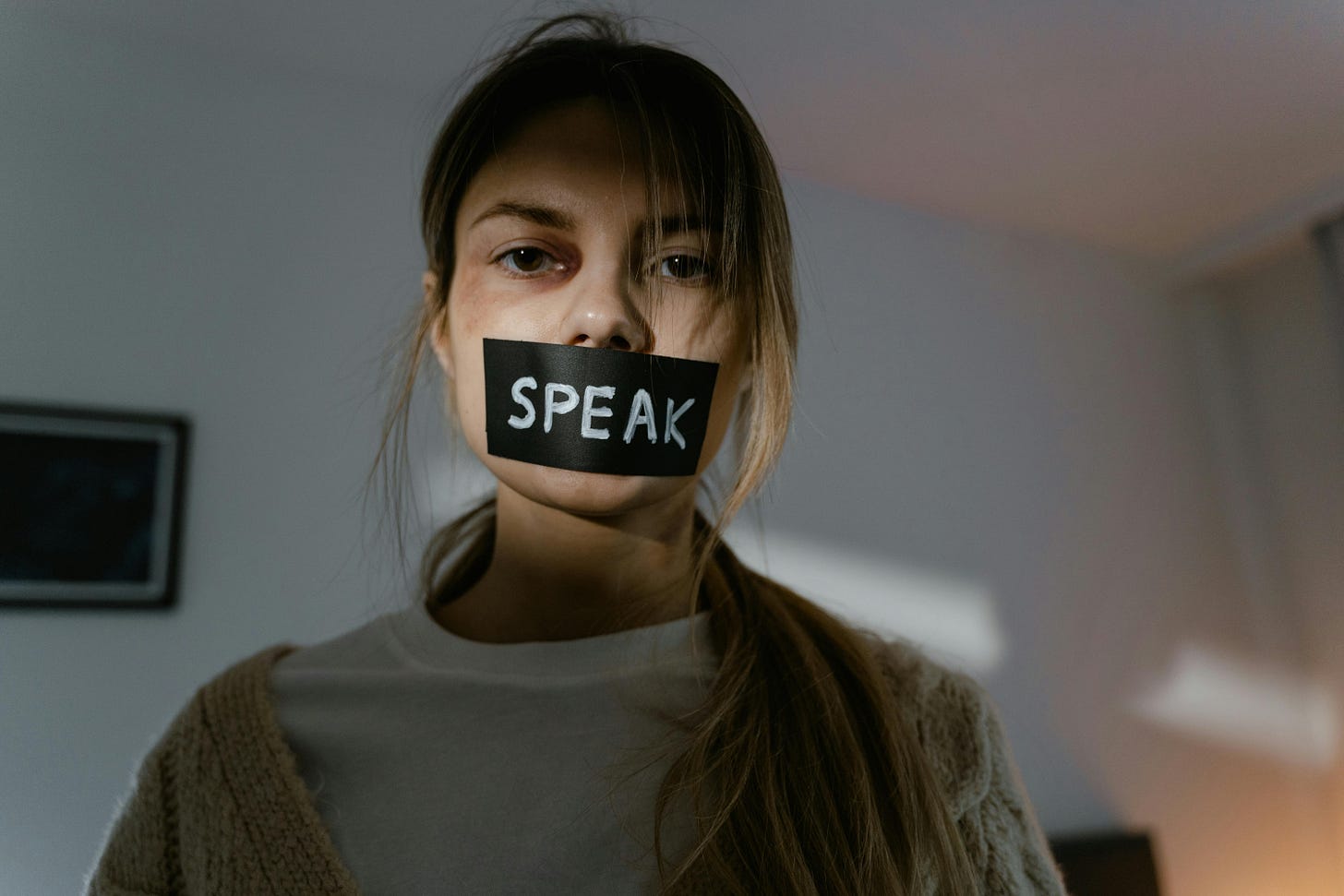The Weight of Disbelief: The Lasting Impact of Disbelief and Disregard
When you don't believe someone, you don't just dismiss their words - you diminish their worth.
CONTENT NOTES: This piece discusses medical gaslighting and includes descriptions of medical events.
Reader discretion is advised.
Today, I want to talk about not being believed and the harm that can result when someone works up the courage to speak up about something (like a need, something that's happened to them, who they are, or a dream they have), and you don't believe them, dismiss them, or degrade them when they communicate with you.
There are many things a person may disclose: need, a boundary, a medical condition, an important aspect of their identity, or abuse they've experienced.
It can be harder to share when we feel as if we may be judged for sharing... or worse... not believed.
Welcome back to another Founding Member Friday!
Twice each month on Friday (sometimes on Thursdays or Saturdays), I put out an exclusive post like this one (often on a more intimate and personal topic OR featuring some of the training materials I’m teaching) that will be brought to you by and for our Founding Members.
The first part of this post is always free to everyone on Substack. However, the end is a special treat reserved exclusively for our Founding Members as a token of deep appreciation for their extra support, which is the lifeblood of this blog (and often literally helps the artist behind it survive). So thank you.
When I am scheduling this post, we have thirty-two Founding Members!
I won’t put them on the spot today, but you know who you are. I can’t thank you enough for your support.
As an Autistic Person, not being believed by those around me has been a common theme in my life since I was very young.
Because people didn't believe me when I spoke up about my needs and experiences, they assumed I was lying, manipulative, or confused.
It was impossible to view me as a capable person with good intentions through this lens (that I was a liar or misinformed). Additionally, not being believed made it difficult (often impossible) for me to have my various needs met.
For example, in the first grade, I tried to wear sunglasses in the classroom, but my teacher took them away.
When I tried to defend myself, exclaiming that "the light was too bright, and hurt my eyes" (something that took a lot of guts to say in front of everyone in the classroom), my teacher told me, "Sun glasses aren't allowed in the building, and nobody else is complaining, so I need to deal with it."
Eventually, "dealing with it," which was me sitting in silence, suffering until the eye aches became headaches.
Every day, after a few hours, the busy and bright classroom environment became too much.
With my head throbbing, I would ask my teacher if I could "go to the nurse's office," hoping the nurse could help me. But because "I didn't have a fever" and "was not contagious," they could (or would) do nothing.
The first time it happened, they called my mom, but the following few times, the nurse just took my temperature, and when it came back that I was "not infectious," she sent me back to class.
Our schools only get funding if the students are in school, so the schools have a monetary motivation to keep a student's butt in a seat, even if it would be better for them to rest at home.
Had I been infectious and posed a risk of lowering the attendance of other students by getting them sick, I would have been allowed to go home and rest. However, since my suffering only impacted me, I was forced to stay in class despite increasing levels of pain.
In elementary school, I learned that schools allow people to go home for fevers, diarrhea, or vomiting, with few exceptions.
In middle school, I learned that my school would require me to attend despite the last two when my stomach problems were found to be "non-contagious."
When the nurse sent me back to class and told me I "couldn't keep coming to see her and had to stay in class" because "there was nothing she could do for me," I learned that it didn't matter if I was in pain. What mattered was that I was in class with everyone else.
So I went to class.
Years later, I was still having regular headaches, but I still didn't know why.
By middle school, my chronic headaches (which I rarely mentioned to anyone because they'd become baseline/normal for me) had become migraines.
Eventually, the migraines began to escalate into violent neurological events (that gripped my stomach and bowels, filling me with dizziness and disorientation).
Because vomiting was one of the qualifiers for going home, this new ailment provided me a pass to go home (and stay home) from school for up to 12 days each school year (6 in the first six months of the year and 6 in the last semester).
Once I hit the 12-day mark but was still sick, the school had a problem with me staying home, demanding answers from a medical team.
Unfortunately, my guardians did not have much luck finding a medical team to help me.
None of the doctors we'd seen had any answers as to what was wrong with my stomach. I'd been given many prescriptions, but none of them helped. There was nothing "physically wrong with me."
One thing the school quickly latched onto was that my problems "weren't contagious"—meaning I could attend school while vomiting and not "pose a risk" to other students.
My school insisted that I attend, and "if I missed any more school while not contagious," it would be considered an unexcused absence, and my guardians may face legal action.
In Texas, "if a student is absent from school without an acceptable excuse for ten or more days, or parts of days, within six months, the parent may be subject to prosecution, and the student may be referred to truancy court."
The school's greed and desperation for state funding forced me to attend middle school while needing to run to the bathroom every 10-20 minutes (or work with a trashcan by my desk, denied the dignity of privacy, forced to perform my sickness in front of a room full of my peers as punishment by teachers who thought I was faking my sickness for attention).
I was not believed.
I was not listened to.
I learned my needs didn't matter and that no matter how bad I felt, it didn't give me the right to rest.
I learned to go to school sick, and then I learned to go to work sick.
I learned to tune out of my body and keep functioning like everything is fine, no matter how bad I feel.
For years, the migraines and headaches continued, and sometimes, when things got terrible, my neurological and stomach problems would come back to haunt me.
I gave up on finding an answer to where these ailments came from after years of being blamed instead of believed when I tried to talk about the pain.
I assumed I would always have headaches and that there was nothing I could do about them (when I didn't know what caused them).






